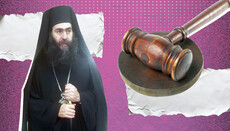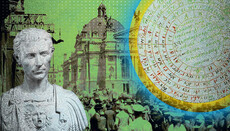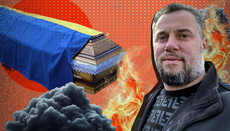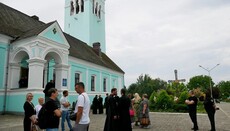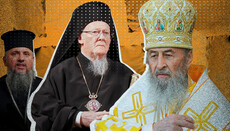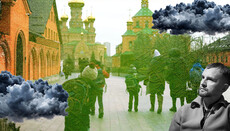Bishop Clement: not only UOC, but most Ukrainians Want the War to Stop
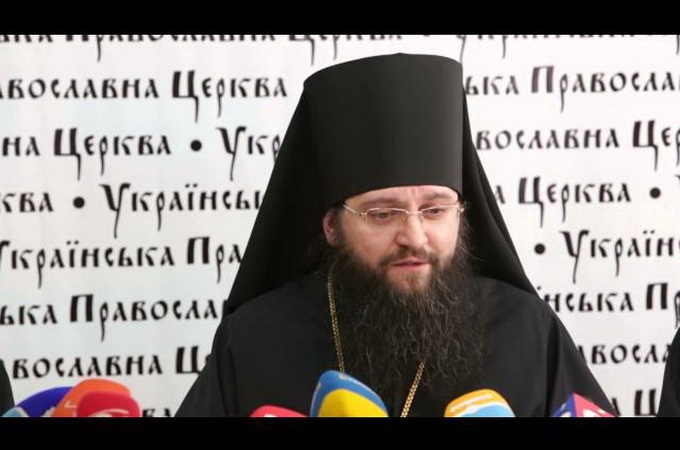
In an interview to the Facts the head of the Synodal Information Department of the UOC, Bishop of Irpin Clement denies widespread accusations of the UOC.
- Journalists of the BBC call the events in Donbass civil war, official Kyiv - ATO, readers of the Facts – war between
- It’s the politicians in the first line who must define the essence of it. The Verkhovna Rada (the Supreme Council) has not adopted a specific definition yet. The term "war" in relation to the present events is not used in the legislation. If politicians do not have a clear recognition of the nature of the conflict, we should not expect its political assessment of the church. We must give spiritual evaluation of everything that is happening in the society. This assessment has very little to do with political formulas and definitions.
- If the politicians officially name the ATO into the Russian-Ukrainian war, will the UOC take their position?
- As far as I understand, if this did not happen in the peak of escalation, such expectations will be illusory now. Life is very difficult. And politics, as we all know, is the dirty thing. That is why the Church deliberately restrains from interfering in the political processes and giving political assessments. However, it will do everything possible to reconcile the society. This reconciliation certainly shall not be based on political ideas. We have a very diverse society, and politicians seek to destroy competitors in the struggle for power. Friendship between politicians is very situational. The newest Ukrainian history can be a classic example of this. Unlike politicians, the present Church directs its actions on consolidation and not polarization of the society.
- How different are positions of the UOC and ROC on the events in Donbass? Is your discourse adjusted in
- No, we live in a free society and we feel free to speak our own. The UOC has never masked its position on events in the country. The Church has always supported good beginnings, peace efforts; it has never expressed support for the war. I think the UOC shares this view with most Ukrainians. We were surprised to hear some Ukrainian religious leaders who rattle sabres.
- What’s the subordination level of the UOC to the ROC?
- According to the statute, the UOC is a self-governing religious organization, which independently determines the direction of its activities, elects the primate, the episcopate, and in this sense we are a totally independent church. The Moscow Patriarchate is canonically the link that connects us to the Ecumenical Orthodoxy. The expression of worship unity is a commemoration of Patriarch of Moscow and All Russia Kirill at the liturgy. No more subordination. The Moscow Patriarch does not specify the nature of the inner life of the UOC. However, all the bishops of the UOC influence the processes in the Russian Orthodox Church, because they participate in the work of the Holy Synod of the Russian Orthodox Church and the election of the Patriarch of Moscow. No bishop of the ROC participates either in the election of the Metropolitan of Kyiv or in the work of the Synod of the Ukrainian Orthodox Church. For example, during the election of the latter Patriarch of Moscow (Kirill), the candidate of the late Metropolitan Vladimir was also proposed, but he himself withdrew from election. But he presented an absolutely real figure, which could by supported not only by bishops from
- Why has religion become a bone of contention in
- In early 1990s, the Ukrainian state was on a crossroads of what basis it should be built on. Then President Leonid Kravchuk took the church factor as ideological support for his activities. In particular, in 1992 there was a church schism, which had no canonical bases. It was confirmed by all the Local Orthodox Churches in the world. Then there were no church levers to fix this division. Instead, political factors were used, which led to raider seizure of churches. In early 1990s, it was very aggressive. In addition, the Uniates gained momentum, coming out into the open. They also considered it possible to use completely wild methods to restore its existence, despite appeals to their Europeanness. They often resorted to physical force. Today representatives of the church, which is not recognized by the world Orthodoxy, believe that the law does not apply to them. So again we hear about the raider seizure of churches.
- Are you under more pressure in 2015?
- Of course.
- Because of the wave of nationalism?
- In particular. We are experiencing all the difficulties that exist in this country. Over the past two years, much has happened that is inappropriate to the rule-of- law state.
- For example?
- Local councils, including Kyiv, and Mykolaiv and Ternopil regional council exempted all religious communities, except the UOC, from taxing, with clear wording that it is an anti-Ukrainian Church. I believe this is not possible in the
- Why do people believe that UPC is anti-Ukrainian?
- I'm not sure that people think so.
- Are there any other decisions that you disapprove?
- What politicians say and what the society think are two different things. Even in the last few years we have made sure of this many times.
- What is the Russian Orthodox world how to respond to the fact that armed people are going to Donbass to defend Christendom from, at least, Gayrope?
- I'm not an expert on the Russian world. Obviously, those who developed the idea of the Russian world hardly laid in its foundation some militant bases. As for the question of Orthodox troops in Donbass - the issue shouldn’t be referred to the UOC, because it has never created the preconditions to even think about their relationship to the church.
- Is there any priest who took arms?
- None of the canonical Ukrainian Orthodox Church priests, who belong to any of the dioceses, takes up arms. It is against the canons. Moreover, no priest of the UOC, including Luhansk and
- And how does Kyiv influence those priests who remain in the occupied territories?
- Direct, as
- Does it contact with them?
- Of course. Their bishops participate in the Holy Synod of the Orthodox Church. Since we cannot go to the uncontrolled territories, these bishops visit Kyiv and their activities are fully consistent with the position of the UOC for the conflict. The UPC has repeatedly advocated the preservation of the territorial integrity of
- Are they detached from the conflict?
- Detached as possible. We must clearly realize that we communicate in Kyiv, and I see more sense and logic to talk about Donbass in Donbass, the Crimea - in the
- That is, some videos where priests supported militants are fake?
- At least, you haven’t seen any bishops in them.
- Saw priests.
- Each case should be discussed separately. Not always these people are priests, or priests of the UOC. There is a lot of speculation on this issue. Many priests on YouTube videos have long been forbidden to serve.
- Are there any facts of seizure of churches, of church property?
- A lot of property has been destroyed. Dozens of churches are destroyed completely or partially. In particular, Gennady Moskal in Luhansk region cited statistics about 8 destroyed churches. In the
- What was taken?
- All that is valuable for sale. Parties to the conflict accuse each other of atrocities. From reliably documented information it is known that a church in Trekhizbentsi was lifted by representatives of the"counterintelligence” of one of the volunteer detachments. This fact was reported by the media and proved by the SBU. The information on other cases is quite contradictory. It is still difficult to keep statistics for continuous chaos.
- Has the UOC evacuated valuable property?
- No, it hasn’t.
- How many parishioners are left in the occupied territories?
- It is impossible to calculate. In Pisky, Popasna, Troitsky, even when most of the residents left their villages, the priests served in churches. Only when the shelling was very intense, they did not come to churches. Such cases are not rare. These priests are heroes of
- How much humanitarian aid does the UOC provide?
- Each diocese has humanitarian initiatives. Besides, there are church-wide programmes, which are often related to voluntary organizations. The UPC is the largest non-governmental organization that sends humanitarian aid to Donbass. Since the beginning of the year, Donbass civilians have received through church care centers nearly 2.5 thousand tons of humanitarian cargo, which consisted of food, medicines, clothing, hygiene products, baby food, etc. In addition, it raised more than 5 million hrn. These funds went to civilians, internally displaced persons and Ukrainian soldiers.
- Is this targeted aid?
- And targeted for the civilian population and for the armed forces. Aid may be general or specific for a particular military unit. For example, in Zaporizhia there was a military hospital in a very bad condition. When the number of wounded increased, Zaporizhia diocese alone fully restored the hospital. I personally participated in the delivery of humanitarian supplies to Severodonetsk. Everyone who has a certificate of an IDP receives clothes, food, medicine, etc. Special aid was sent to orphanages. Infants need special nutrition, which is also provided by the UPC.
- What criticism does the Church accept?
- Each member of the Church tries to live honestly. Even if this causes misunderstanding. Conscience accepts healthy criticism. Today we live under conditions ruled not by law and conscience, but by information space. The most important thing for it is rating. High rated news is conflicting news, provocative. The news does not say how much good the UOC does.
- Is it correct to criticize the behavior of church members by seculars?
- To taboo criticism is impossible. Another thing is if it is correct for someone to blame somebody else without any ground. The difficulty is that in a secular environment honor and reputation can be restored in a judicial procedure. For the Church it is not common to disprove false information in courts or other judicial bodies. A lot of people are speculating on this. "The Church did not read the last rites over ATO soldiers." But it never happened, but how to make the media refute fakes? Sue? We could, but then we lose the reputation of public institutions, which calls first of all to forgive, not to pay attention to slander, for so did Christ.
- Does the UOC read the burial service over ATO soldiers?
- Of course, if they are Orthodox. His Beatitude Patriarch Onufry himself reads the last rites. Never has the UOC refused to do it. There were cases of provocation. Provocations on sacred things, when a dead soldier was brought in, and the authorities forced representatives of different denominations to stand in a line and rule memorial service. Such burial service is against canons. The UOC reads the burial service over the soldier. It only doesn’t approve of speculating and making show out of it.
- What are your relations with, as you call them, schismatics?
- Relations as they should be with schismatics. We appeal to stop shaking the church craft in
- Is the Ecumenical Council of 2016 important?
- It is not, in fact, an ecumenical council – it’s a pan-Orthodox meeting. It shall determine important aspects of church life the Church confronts in the 21st century. - Example? - The attitude of the Church to environmental issues; Church and new advances in biotechnology; those aspects, to which we have no direct answer, based on the works of the Fathers or even in the Scriptures. In addition, there are many other issues under consideration. For example, providing churches autocephaly and autonomous status, or the so-called diptych – a position every church has on a list of autocephalous churches of the world. For me, these questions are insignificant compared with the problems the Church faces today, - in particular, the problem of secularization, the environmental crisis, causes of economic crises. The agenda of the Orthodox meeting hasn’t been fully agreed yet. To the point, its decisions are not made by vote, but by consensus, as at ecumenical councils.
Rostislav Buniak
Source: fakty.ictv.ua
